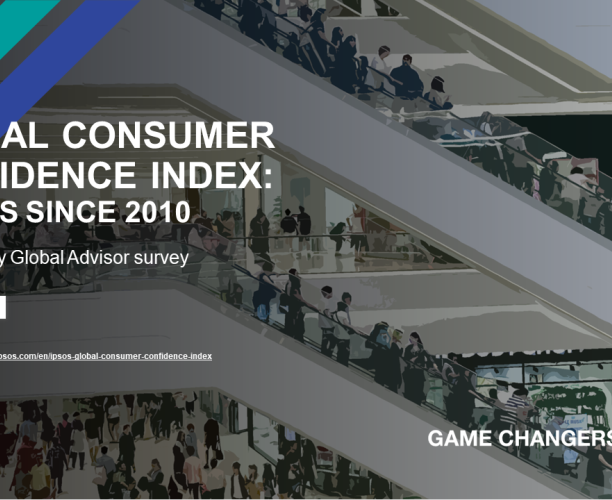

India holds onto pole position with highest national index score across 29 countries, despite the consumer sentiment lowering in April 2024: LSEG-Ipsos PCSI monthly survey
India continues to sit at the top of the consumer confidence index with the highest national index score of 67.0, despite a 5.0 percentage point drop in overall consumer sentiment index in April 2024, according to the LSEG-Ipsos Primary Consumer Sentiment Index (PCSI).
Among the 29 countries, India (67.0) and Indonesia (65.1) remain the only countries with a National Index score of 60 or higher.
Ten other countries now show a National Index above the 50-point mark: Mexico (59.8), Thailand (57.6), the Netherlands (54.8), Singapore (54.6), Sweden (54.5), the U.S. (53.4), Brazil (53.3), Poland (50.3), Great Britain (50.2) and Australia (50.1).
In contrast, just three countries show a National Index below the 40-point mark: South Korea (39.6), Türkiye (36.8), and Hungary (33.2).
Each month, Ipsos tracks attitudes of consumers in 29 markets on the current and future state of their local economy, their personal financial situation, the employment climate, and their purchasing and investing confidence.
Consumer sentiment lowers in April 2024 for India
The overall or national index has experienced a drop of 5.0 percentage points in April 2024 for India. Further, consumer sentiment has fallen across the 4 sub-indices (the PCSI is an aggregation of four weighted sub-Indices) - the PCSI Employment Confidence (“Jobs”) Sub- Index, is down 6.3 percentage points; the PCSI Current Personal Financial Conditions (“Current Conditions”) Sub-Index is down 6.6 percentage points; the PCSI Investment Climate (“Investment”) Sub-Index is down 6.5 percentage points; and the PCSI Economic Expectations (“Expectations”) Sub-Index has a minor drop of 1.5 percentage points.
Summarizing on the findings of the survey, Amit Adarkar, CEO, Ipsos India said, “India continues to show the highest national index score of 67.0 percentage points despite the drop in consumer sentiment this month. There is lowering of consumer sentiment overall and largely driven by lowering of sentiment for personal finances, investments, jobs and the economy. Consumers are experiencing financial crunch for not only day-to-day running of households but also for savings and investments. We see downgrading of confidence for jobs. End of the financial year for a lot of companies would mean freeze on hiring by India Inc. And it should pick up in May/ June. Further, around this time, the tax burden increases on personal incomes, tightening the tight rope for discretionary spends. Also, it is election time in India. For 2 months no course correction or sops are likely to be announced by the incumbent government.”
Sentiment is largely up throughout Europe. Sweden (+3.6 points), Great Britain (+3.1 points), France (2.8 points), and Spain (+2.5 points) all show significant gains this month. For Sweden, this month’s reading is the country’s highest in nearly two years.
In contrast, sentiment is more mixed in other regions. In the Asia-Pacific region, consumer confidence is up in Thailand (+2.1 points), while India (-5.2 points) shows the largest decline of any country. In Latin America, Argentina (+3.7 points) shows the largest increase among all countries, while sentiment declined sharply in Brazil (-3.5 points).
The Global Consumer Confidence Index is the average of all surveyed countries’ Overall or “National” indices. This month’s installment is based on a monthly survey of more than 21,000 adults under the age of 75 from 29 countries conducted on Ipsos’ Global Advisor online platform. This survey was fielded between March 22 and April 5, 2024.
 About the Study
About the Study
These findings are based on data from a monthly 29-country survey conducted by Ipsos on its Global Advisor online survey platform and, in India, on its IndiaBus platform. They are first reported each month by LSEG as the Primary Consumer Sentiment Index (PCSI).
The results are based on interviews with over 21,200 adults aged 18+ in India, 18-74 in Canada, Israel, Malaysia, South Africa, Türkiye, and the United States, 20-74 in Thailand, 21-74 in Indonesia and Singapore, and 16-74 in all other countries. The sample in India consists of approximately 2,200 individuals of whom 1,800 were interviewed face-to-face and 400 were interviewed online.
The monthly sample consists of 1,000+ individuals each in Australia, Brazil, Canada, France, Germany, Great Britain, Italy, Japan, Spain, and the U.S., and 500+ individuals in each of Argentina, Belgium, Chile, Colombia, Hungary, Indonesia, Israel, Malaysia, Mexico, the Netherlands, Peru, Poland, Singapore, South Africa, South Korea, Sweden, Thailand, and Türkiye. The sample in India consists of approximately 2,200 individuals of whom 1,800 were interviewed face-to-face and 400 were interviewed online.
Samples in Argentina, Australia, Belgium, Canada, France, Germany, Great Britain, Hungary, Italy, Japan, the Netherlands, Poland, South Korea, Spain, Sweden, and the U.S. can be considered representative of their general adult populations under the age of 75. Samples in Brazil, Chile, Colombia, Indonesia, Israel, Malaysia, Mexico, Peru, Singapore, South Africa, Thailand, and Türkiye are more urban, more educated, and/or more affluent than the general population. The survey results for these countries should be viewed as reflecting the views of the more “connected” segment of their populations. India’s sample represents a large subset of its urban population — social economic classes A/B/C in metros and tier 1-3 town classes across all four zones.
The data is weighted so that the composition of the sample in each country best reflects the demographic profile of the adult population according to the most recent census data.
The global indices and averages reported here reflect the average result for all the countries and markets in which the survey was conducted. They have not been adjusted to the population size of each country or market and are not intended to suggest “total” results.
Sample surveys and polls may be subject to other sources of error, including, but not limited to coverage error and measurement error. The precision of Ipsos online surveys is calculated using a Bayesian credibility interval with a survey of N=1,000 being accurate to +/- 3.5 percentage points and a survey of N=500 being accurate to +/- 5.0 percentage points. For more information on credibility intervals, visit this page.
The LSEG/Ipsos Primary Consumer Sentiment Index (PCSI), ongoing since 2010, is a monthly survey of consumer attitudes on the current and future state of their local economy, personal financial situation, savings, and confidence to make major investments. The PCSI metrics reported each month for each of the countries surveyed consist of a “Primary Index” based on all 10 questions below and of several “sub-indices” each based on a subset of these 10 questions.
The publication of these findings abides by local rules and regulations.



